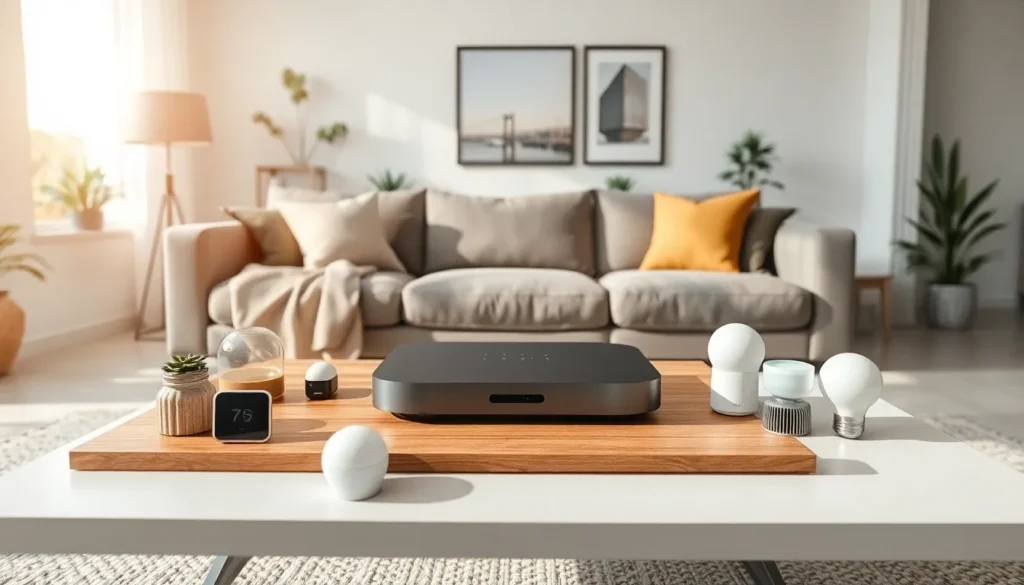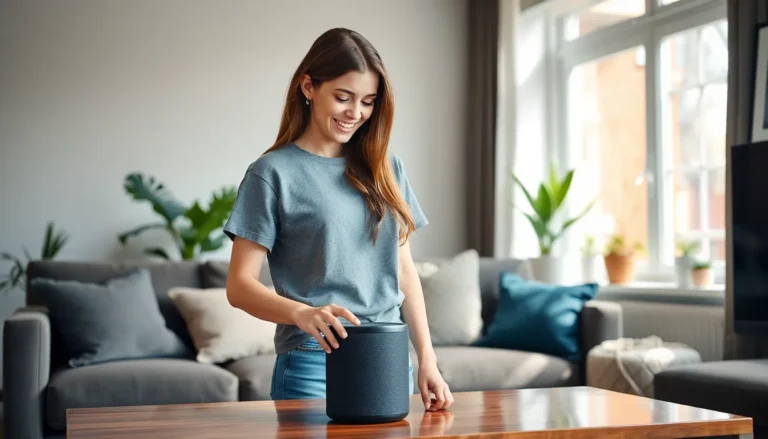In a world where even your toaster can be smarter than your average bear, smart home hubs are the unsung heroes of modern living. These nifty gadgets aren’t just for tech enthusiasts; they’re like the charming conductors of a symphony, orchestrating your devices to create a harmonious home environment. Imagine controlling your lights, thermostat, and even the coffee maker—all with a single command. It’s like having a personal assistant who never takes a coffee break.
But let’s face it, not all heroes wear capes. Some come in sleek designs and connect your life in ways you never thought possible. With a smart home hub, you’re not just upgrading your home; you’re stepping into the future. So, if you’re ready to turn your home into a tech-savvy wonderland, it’s time to discover what these hubs can do for you.
Table of Contents
ToggleOverview of Smart Home Hubs
Smart home hubs serve as central control points in modern residences. These devices connect various smart home products, enabling seamless communication among them. Users can manage different systems, including security cameras, lighting, and heating, using a single interface.
Compatibility is a crucial factor in selecting smart home hubs. Many models support popular protocols such as Zigbee, Z-Wave, and Wi-Fi. This wide compatibility allows users to integrate a vast array of devices, enhancing the overall smart home experience.
Interconnectivity improves automation capabilities. Users can create routines or scenes that automate multiple actions with a single command. For instance, a morning routine may include adjusting the thermostat, turning on lights, and brewing coffee simultaneously.
Performance and reliability remain essential considerations. Selecting a hub with a robust processor facilitates quick device responses. Security also matters, as smart home hubs should include encryption features to protect user data.
Voice control integration enhances usability. Many smart hubs work with voice assistants like Amazon Alexa or Google Assistant. This feature allows users to operate devices through simple voice commands, increasing convenience.
Overall, smart home hubs represent an investment in both convenience and efficiency. These devices streamline home management, making daily tasks easier and more enjoyable. As technology advances, smart home hubs will play a pivotal role in shaping the future of home automation.
Features of Smart Home Hubs

Smart home hubs offer various essential features that enhance home automation experiences. These features enable seamless control and connectivity across multiple devices.
Connectivity Options
Multiple connectivity options exist within smart home hubs. Zigbee, Z-Wave, Bluetooth, and Wi-Fi provide robust connections. Many hubs accommodate different wireless protocols, ensuring flexible communication among devices. Integrating these options simplifies interaction with various smart products, allowing users to operate lights, locks, and thermostats collectively. Homeowners can enjoy an interconnected environment with minimal setup. Reliable connectivity serves as a backbone for effective automation.
User Interface
User interfaces play a crucial role in the effectiveness of smart home hubs. Intuitive designs enable easy navigation. Many hubs feature touchscreens, mobile apps, or voice control options, which make them accessible for all users. Clear layouts facilitate quick access to device settings and automation routines. Customizable dashboards further enhance user experience, making it simple to organize and monitor multiple devices. The overall goal remains clear: streamlined interaction to improve home management.
Compatibility with Devices
Compatibility with devices determines the functionality of smart home hubs. A wide range of brands and models can connect to hubs that support popular standards. Established brands typically design their devices for easy integration, ensuring they work seamlessly with hubs. Advanced hubs support various categories, including lighting, security, and entertainment systems. This compatibility allows users to build a cohesive smart home ecosystem. Enhanced automation options arise as users combine devices from different manufacturers.
Benefits of Using Smart Home Hubs
Smart home hubs provide several advantages that enhance user experience and home management. These benefits include increased convenience and improved energy efficiency, allowing users to enjoy a more connected living environment.
Convenience and Control
Convenience distinguishes smart home hubs from traditional systems. Users access control over multiple devices from a single interface. Simplified management of functions such as lighting, temperature, and security improves daily routines. Scheduling routines facilitates automation, so actions occur without user input. Voice controls compatible with popular AI assistants streamline this process further. Conflicts often arise between devices, but smart hubs mitigate these issues, ensuring seamless operation. Intuitive interfaces enhance usability, making it easy for everyone in the household to manage their environment.
Energy Efficiency
Energy efficiency represents a significant benefit of smart home hubs. Devices connected through these hubs can operate on schedules optimized for energy savings. For instance, smart thermostats adjust heating and cooling based on occupancy. Integration of energy monitoring tools enables users to track consumption, making informed decisions about usage. Moreover, users can set alerts for unusual energy spikes, highlighting the need for action. By automating lighting based on natural sunlight availability, systems reduce waste. Smart hubs empower households to utilize resources effectively while saving money on utility bills.
Popular Smart Home Hubs on the Market
Smart home hubs simplify the management of connected devices, offering various options to meet diverse needs. Below are some of the most popular smart home hubs available.
Amazon Echo Plus
Amazon Echo Plus stands out with its built-in Zigbee hub, allowing direct integration with compatible devices. This feature eliminates the need for extra hubs, simplifying setup. Voice control through Alexa enhances user experience, enabling hands-free operation for seamless management of tasks. The device supports a range of smart home products, from lights to thermostats, making it flexible for different setups. Additionally, Echo Plus functions as a Bluetooth speaker, providing entertainment while doubling as a smart home controller.
Google Nest Hub
Google Nest Hub features a sleek design that blends with home decor while offering a touchscreen interface for easy navigation. This device excels in voice command functionality using Google Assistant, allowing users to interact naturally with their smart home. Compatibility extends to a wide array of devices, ensuring a cohesive experience across multiple brands. Users appreciate access to visual information through the display, enhancing automation routines and scheduling. As an added benefit, Nest Hub integrates with Google services, allowing users to manage calendar events or display photos effortlessly.
Samsung SmartThings
Samsung SmartThings acts as a comprehensive solution for managing various smart devices. This hub supports multiple protocols, including Zigbee and Z-Wave, which promotes interoperability among different brand products. Users find the SmartThings app intuitive, offering control over devices, scenes, and automation easily from a mobile interface. Real-time notifications keep users informed about their home environment, enhancing security and peace of mind. SmartThings also integrates with Samsung appliances, creating an expansive ecosystem for seamless home automation.
Smart home hubs are transforming the way people interact with their living spaces. By centralizing control over various devices they simplify daily routines and enhance energy efficiency. With options like the Amazon Echo Plus Google Nest Hub and Samsung SmartThings users can find a hub that fits their specific needs and preferences.
As technology continues to evolve these hubs will play an increasingly vital role in creating seamless smart home ecosystems. Embracing this technology not only streamlines home management but also paves the way for a more connected and efficient future. Investing in a smart home hub is a step towards modern living that brings convenience and innovation into everyday life.




